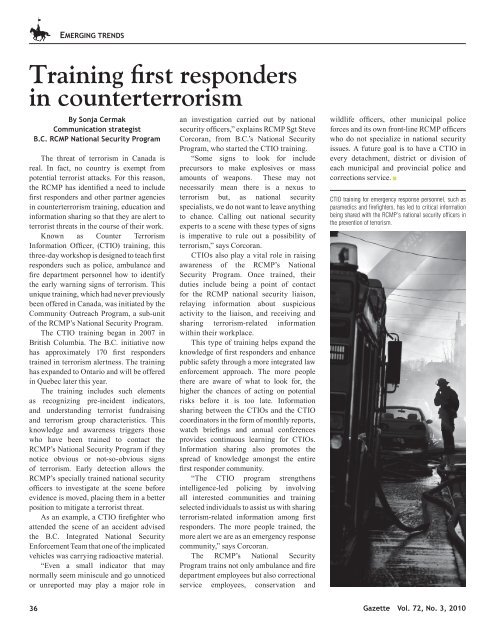RCMP Gazette Human Rights and Policing - Alberta Hate Crimes ...
RCMP Gazette Human Rights and Policing - Alberta Hate Crimes ...
RCMP Gazette Human Rights and Policing - Alberta Hate Crimes ...
Create successful ePaper yourself
Turn your PDF publications into a flip-book with our unique Google optimized e-Paper software.
EMERGiNG TRENDSTraining first respondersin counterterrorismby Sonja CermakCommunication strategistb.C. <strong>RCMP</strong> National Security ProgramThe threat of terrorism in Canada isreal. In fact, no country is exempt frompotential terrorist attacks. For this reason,the <strong>RCMP</strong> has identified a need to includefirst responders <strong>and</strong> other partner agenciesin counterterrorism training, education <strong>and</strong>information sharing so that they are alert toterrorist threats in the course of their work.Known as Counter TerrorismInformation Officer, (CTIO) training, thisthree-day workshop is designed to teach firstresponders such as police, ambulance <strong>and</strong>fire department personnel how to identifythe early warning signs of terrorism. Thisunique training, which had never previouslybeen offered in Canada, was initiated by theCommunity Outreach Program, a sub-unitof the <strong>RCMP</strong>’s National Security Program.The CTIO training began in 2007 inBritish Columbia. The B.C. initiative nowhas approximately 170 first responderstrained in terrorism alertness. The traininghas exp<strong>and</strong>ed to Ontario <strong>and</strong> will be offeredin Quebec later this year.The training includes such elementsas recognizing pre-incident indicators,<strong>and</strong> underst<strong>and</strong>ing terrorist fundraising<strong>and</strong> terrorism group characteristics. Thisknowledge <strong>and</strong> awareness triggers thosewho have been trained to contact the<strong>RCMP</strong>’s National Security Program if theynotice obvious or not-so-obvious signsof terrorism. Early detection allows the<strong>RCMP</strong>’s specially trained national securityofficers to investigate at the scene beforeevidence is moved, placing them in a betterposition to mitigate a terrorist threat.As an example, a CTIO firefighter whoattended the scene of an accident advisedthe B.C. Integrated National SecurityEnforcement Team that one of the implicatedvehicles was carrying radioactive material.“Even a small indicator that maynormally seem miniscule <strong>and</strong> go unnoticedor unreported may play a major role inan investigation carried out by nationalsecurity officers,” explains <strong>RCMP</strong> Sgt SteveCorcoran, from B.C.’s National SecurityProgram, who started the CTIO training.“Some signs to look for includeprecursors to make explosives or massamounts of weapons. These may notnecessarily mean there is a nexus toterrorism but, as national securityspecialists, we do not want to leave anythingto chance. Calling out national securityexperts to a scene with these types of signsis imperative to rule out a possibility ofterrorism,” says Corcoran.CTIOs also play a vital role in raisingawareness of the <strong>RCMP</strong>’s NationalSecurity Program. Once trained, theirduties include being a point of contactfor the <strong>RCMP</strong> national security liaison,relaying information about suspiciousactivity to the liaison, <strong>and</strong> receiving <strong>and</strong>sharing terrorism-related informationwithin their workplace.This type of training helps exp<strong>and</strong> theknowledge of first responders <strong>and</strong> enhancepublic safety through a more integrated lawenforcement approach. The more peoplethere are aware of what to look for, thehigher the chances of acting on potentialrisks before it is too late. Informationsharing between the CTIOs <strong>and</strong> the CTIOcoordinators in the form of monthly reports,watch briefings <strong>and</strong> annual conferencesprovides continuous learning for CTIOs.Information sharing also promotes thespread of knowledge amongst the entirefirst responder community.“The CTIO program strengthensintelligence-led policing by involvingall interested communities <strong>and</strong> trainingselected individuals to assist us with sharingterrorism-related information among firstresponders. The more people trained, themore alert we are as an emergency responsecommunity,” says Corcoran.The <strong>RCMP</strong>’s National SecurityProgram trains not only ambulance <strong>and</strong> firedepartment employees but also correctionalservice employees, conservation <strong>and</strong>wildlife officers, other municipal policeforces <strong>and</strong> its own front-line <strong>RCMP</strong> officerswho do not specialize in national securityissues. A future goal is to have a CTIO inevery detachment, district or division ofeach municipal <strong>and</strong> provincial police <strong>and</strong>corrections service. ▪CTIO training for emergency response personnel, such asparamedics <strong>and</strong> firefighters, has led to critical informationbeing shared with the <strong>RCMP</strong>’s national security officers inthe prevention of terrorism.36<strong>Gazette</strong> Vol. 72, No. 3, 2010







